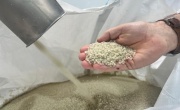Scottish councils unprepared for landfill ban, says report
Scotland is not adequately prepared for its upcoming landfill ban, according to a Scottish Government report published today (24 April).
Produced by Eunomia Research and Consulting on behalf of the Scottish Government, the report considers the progress that has been made so far towards addressing the ban, which will come into force on 1 January 2021. After that point, no landfill operators in Scotland will be allowed to accept biodegradable municipal waste (BMW).
 BMW refers to household waste (and waste similar to household waste, such as from the retail and hospitality sectors) that is capable of undergoing anaerobic or aerobic decomposition. In practice this definition includes a wide range of different materials, including food and garden waste, textiles, wood, paper, cardboard, packaging and residual (‘black bin’) waste. It does not include construction and demolition (C&D) waste.
BMW refers to household waste (and waste similar to household waste, such as from the retail and hospitality sectors) that is capable of undergoing anaerobic or aerobic decomposition. In practice this definition includes a wide range of different materials, including food and garden waste, textiles, wood, paper, cardboard, packaging and residual (‘black bin’) waste. It does not include construction and demolition (C&D) waste.
Eunomia also looked into the current availability and costs of alternative disposal options, including incineration in domestic energy from waste (EfW) facilities, exporting as refuse-derived fuel (RDF) to overseas EfW facilities and sending waste to other landfills around the UK.
The ban was first announced as part of the Waste (Scotland) Regulations 2012, and is one element of the Scottish Government’s Zero Waste Plan, published in 2010, which aims to achieve a nationwide 70 per cent recycling rate by 2025, with only five per cent of remaining waste ending up in landfill.
How prepared are councils and businesses?
According to the new report, Scotland’s local authorities and waste management companies have made little overall progress in preparation for the ban.
Looking at a 2017 survey of Scottish local authorities conducted by the Scottish Environmental Protection Agency (SEPA), the report finds that 14 out of a total 32 local authorities have a solution in place for their BMW, while three have long-term solutions that won’t be ready in time for the ban and six have short-term solutions but no long-term plans. In total, nine local authorities have no solution in place at all.
As well as local authorities, the report surveys waste management operators and reveals that ‘few have developed specific plans to prepare for the ban’. Through interviews with commercial waste contractors in Scotland, the report notes that most strategies in development are focused on transporting waste across the border into Northern England, for landfill or treatment, which is likely to push up the costs of managing waste.
The domestic capacity gap
Modelling by Eunomia shows that insufficient residual waste treatment capacity has been developed in Scotland to meet the increased needs brought about by the planned landfill ban. Even if Scotland were to meet all of its recycling and waste prevention targets up to 2035, its treatment capacity would fall short by 1.01 million tonnes. If the country continues in its current pattern of waste generation and recycling, the capacity gap would be more like 1.28 million tonnes. And even if the country were to construct additional domestic treatment facilities, sufficient capacity could not feasibly be operational by 2021.
To deal with this capacity gap, Scotland could make use of spare treatment capacity in England or continental Europe, or send waste to landfill in Northern England. However, some companies have raised concerns about whether they will be able to access capacity outside of Scotland, especially given that landfill availability in England is likely to fall.
‘Significant rise’ in costs
The report states that the ban will likely result in ‘significant economic costs’ to Scotland as an increased amount of residual waste will need to be exported, meaning that landfill tax revenue will effectively be exported out of Scotland to England or elsewhere.
Looking at local authorities, those that have not secured a short- or long-term solution to the ban are likely to face especially high costs in the short term, especially those that are forced to rely on the export market. However, cost impacts can be reduced if waste minimisation and recycling targets are met, as less residual waste will need to be treated. Additionally, if new domestic treatment capacity is developed, revenue from waste can be kept in Scotland, further mitigating long-term costs.
Responding to the report, the Scottish Environmental Services Association (SESA), which represents businesses in Scotland’s waste and recycling sector, stated that while industry is already investing in additional domestic capacity, the Scottish Government’s commitment to this solution is lacking.
SESA’s Policy Advisor, Stephen Freeland, said: “To unlock investment in sufficient non-landfill capacity the industry needs more commitment from the Scottish Government than a fleeting reference to the landfill ban within regulation. This investment is reliant upon a strong and enabling waste policy framework for non-recyclable waste which has, up to now, been sadly lacking. We suggest that the Scottish Government provides details of a long term infrastructure and investment plan for Scotland to allow private and public-sector partners to adequately identify options for appropriate development.”
‘A £100-million Landfill Tax gift to the English revenue’
Freeland continued: “SESA Members aim at all times to achieve cost effective regulatory compliance. Unfortunately, in this case, landfill in England is the only practical option available to the industry for dealing with the majority of the one million tonnes of waste that needs a new home in 2021. This will be a £100-million Landfill Tax gift to the English revenue.”
A spokesperson from the Scottish Government acknowledged that the report “highlights significant challenges associated with delivering the ban”, but stated that “significant progress has already been made on meeting the 2021 target, with more than half of local authorities having long-term or interim solutions in place.
“Our focus now is on working with authorities who do not yet have a solution in place to identify ways, such as collaborative procurement and improved recycling, in which they can comply with the ban. We are also working to raise awareness of the forthcoming ban in the commercial sector.”
CIWM Scotland welcomed the report for shining a light on the “many challenges that the BMW ban poses for our sector.” Bruce Reekie, the organisation’s Vice Chair, explained how CIWM Scotland is looking into interim solutions to the problem through its Landfill Ban for Biodegradable Waste Working Group: “Ideas put forward include proposals for a system based around the principles of the Landfill Allowance Scheme (LAS) with the baseline set to 2021 and with the allowance provided directly to local authorities, or deferrals with increased landfill tax costs to drive progress.”
Zero Waste Scotland (ZWS) stated its continued commitment to supporting the government’s Zero Waste Plan, and pointed to the importance of reuse and recycling, which Eunomia’s report does not take into account. A spokesperson said: “We remain committed to helping local authorities, and the wider resource management industry, find the best solutions for biodegradable waste they collect now and beyond 2021. The best way to combat waste is to prevent it in the first place, so reducing waste and increasing recycling remain key objectives.”
The full report into the Scottish capacity gap can be downloaded and read on the Scottish Government website.






